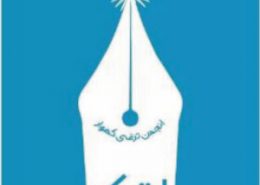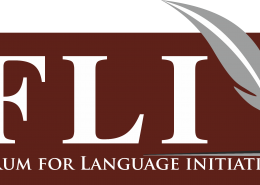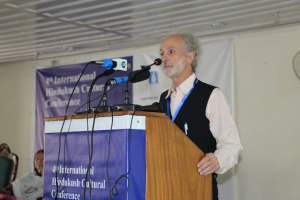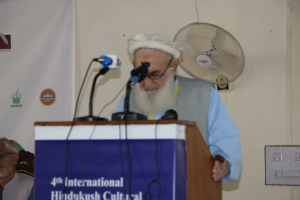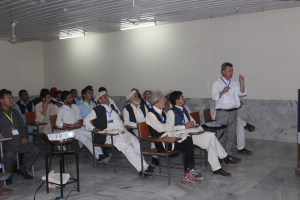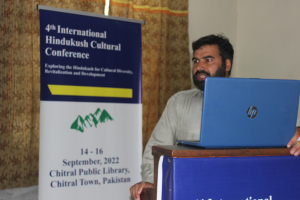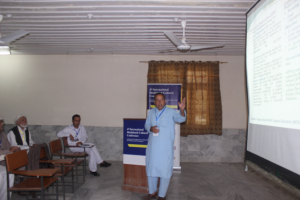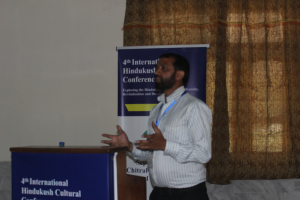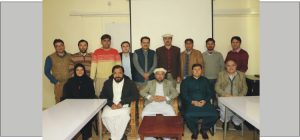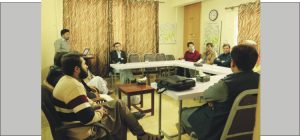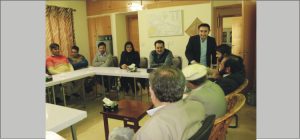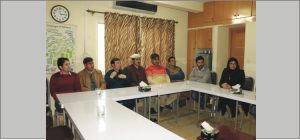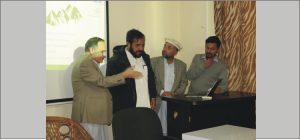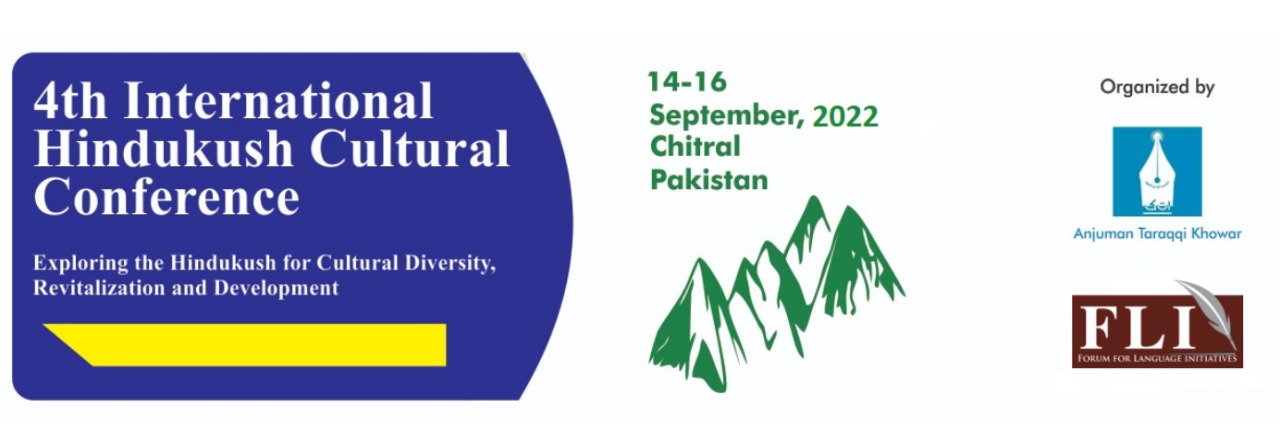
The 4th International Hindukush Cultural Conference is an academic and scholarly activity in continuation of the first conference held in Moesgaard, Denmark in 1970. The 2022 conference will commemorate the golden jubilee of that first conference. The 2nd International Hindukush Cultural Conference was hosted by the Anjuman in Chitral, in August 1990 with Professor Israruddin (Chairman, Department of Geography, University of Peshawar) as convener and Dr Karl Jettmar (South Asian Institute, University of Heidelberg, Germany) as general president. The 3rd conference was hosted by the same organization in Chitral in October 1995, with the same convener and Professor Schuyler Jones (Pitt Rivers Museum, England) as General President. The 4th International Conference will be convened by Professor Israruddin on behalf of the same host to give an opportunity for high profile scholars in the field of Hindukush studies to meet and exchange ideas about their recent works. The conference will bring together national and international scholars.
To provide a platform to researchers, students and professionals from development sector for discussing the social and economic issues and finding solutions through interaction, knowledge sharing and networking.
Conference themes and sub themes will include, but are not limited to the following
• Pre-colonial history of Chitral, Mastuj and Yasin
• Pre-colonial history of Gilgit, Hunza and Nager
• Colonial history of Northern Pakistan
• Historiography of the Chitral and Gilgit areas
• Northern Pakistan in the days of independence and the accession of the northern polities (principalities and stateless communities)
• History and distribution of Muslim confessions in the Hindukush/Karakorum
• History of population movements and migrations in the Hindukush/Karakorum
• Ancient trade routes
• Historical buildings, forts, palaces, mosques, remarkable residences, tower-houses, notable burials, historical sites
• Findings and prospects in the archaeology of the Hindukush/Karakorum
• Post-state History of Chitral
Geography
• Adaptation to climate change in Pakistan’s mountain regions
• Challenges for sustainable development
• Reducing the knowledge gap: recent studies in mountain research
• Regional development of Chitral
• Water towers of humankind: Hindukush and Karakoram revisited
• Pastoralism in the Hindukush
• Exchange relations between Chitral and Afghanistan
• Cultural geography of the Hindukush
Cultural
• Poetry in the local languages of the Hindukush/Karakorum: past and present
• Oral traditions and genealogical knowledge about the past in local communities
• Ethnic and linguistic minorities and their quest for identity
• Music and dance in local traditions
• Polo and other traditional sports
• Tradition and innovation in self-organization of local communities
• Rites of birth, marriage and burial: tradition versus innovation
• The cultural impact of development interventions and new technologies
• Traditional artisans and their crafts
Kalasha Heritage
• Permanence and change in traditional behaviours, practices and conceptions
• Kalasha women between tradition and innovation
• The process of conversion among the Kalasha in the past and in the present
• The present practice of Kalasha traditional ritual
• Development interventions by government and NGOs in Kalasha valleys and their impact on the culture
• Cultural impact of tourism in the Kalasha valleys
• The new Kalasha: the younger generations between tradition and modernity
• Challenges and threats for Kalasha culture and identity
Languages
• Language documentation, description and promotion
• Challenges in implementing of language in Education policy.
• Causes of language endangerment in Hindukush Region
• Language maintenance
• Indigenous voices in popular culture (e.g. social media, fiction, poetry, film, hip hop)
• Multilingualism in Hindukush Region
Mother Tongue Based Multilingual Education (MTB-MLE)
• MTB-MLE theory and Practices
• Curriculum Development
• Mother tongue Education
• Teaching kits
• Practice from Field
• Reading material
• Challenges in Mother Tongue Education
Tourism
• Ecotourism in Hindukush and Karakorum region
• Cultural festivals in Hindukush and Karakorum region
• Recreational and Environment tourism
• Historical and Religious tourism
• Culture and ethnic tourism
• Adventure and Wildlife tourism
• Any other topic in line with tourism Hindukush and Karakorum region
4thInternational Hindukush Cultural Conference
September 14-16, 2022
Chitral, Pakistan
Deadline for submission of Abstracts is May 31, 2022
Final Announcement and Re-Call for Abstracts
Anjuman Taraqqi Khowar (ATK) and the Forum for Language Initiatives (FLI) are pleased to announce a Re-call for Abstracts for the 4th International Hindukush Cultural Conference to be held on 14-16 September 2022. The three-day conference is meant to provide a platform for scholars, students and people from different communities to interact and learn from each other. The 4th International Hindukush Cultural Conference is an academic and scholarly activity in continuation of the first conference held in Moesgaard, Denmark in 1970. The 2022 conference will commemorate the golden jubilee of that first conference. The 2nd International Hindukush Cultural Conference was hosted by the Anjuman in Chitral, in August 1990 with Professor Israruddin (Chairman, Department of Geography, University of Peshawar) as convener and Dr Karl Jettmar (South Asian Institute, University of Heidelberg, Germany) as general president. The 3rd conference was hosted by the same organization in Chitral in October 1995, with the same convener and Professor Schuyler Jones (Pitt Rivers Museum, England) as General President. The 4th International Conference will be convened by Professor Israruddin on behalf of the same host to give an opportunity for high profile scholars in the field of Hindukush studies to meet and exchange ideas about their recent works. The conference will bring together national and international scholars.
The highly motivated team of hosts is looking forward to welcoming you in Chitral in September 2022. The event includes workshops, talks by keynote speakers, paper presentations and excursions, as well as a cultural night.
Conference themes.
Conference themes and sub themes will include, but are not limited to the following
History
• Pre-colonial history of Chitral, Mastuj and Yasin
• Pre-colonial history of Gilgit, Hunza and Nager
• Colonial history of Northern Pakistan
• Historiography of the Chitral and Gilgit areas
• Northern Pakistan in the days of independence and the accession of the northern polities (principalities and stateless communities)
• History and distribution of Muslim confessions in the Hindukush/Karakorum
• History of population movements and migrations in the Hindukush/Karakorum
• Ancient trade routes
• Historical buildings, forts, palaces, mosques, remarkable residences, tower-houses, notable burials, historical sites
• Findings and prospects in the archaeology of the Hindukush/Karakorum
• Post-state History of Chitral
Geography
• Adaptation to climate change in Pakistan’s mountain regions
• Challenges for sustainable development
• Reducing the knowledge gap: recent studies in mountain research
• Regional development of Chitral
• Water towers of humankind: Hindukush and Karakoram revisited
• Pastoralism in the Hindukush
• Exchange relations between Chitral and Afghanistan
• Cultural geography of the Hindukush
Cultural
• Poetry in the local languages of the Hindukush/Karakorum: past and present
• Oral traditions and genealogical knowledge about the past in local communities
• Ethnic and linguistic minorities and their quest for identity
• Music and dance in local traditions
• Polo and other traditional sports
• Tradition and innovation in self-organization of local communities
• Rites of birth, marriage and burial: tradition versus innovation
• The cultural impact of development interventions and new technologies
• Traditional artisans and their crafts
Kalasha Heritage
• Permanence and change in traditional behaviours, practices and conceptions
• Kalasha women between tradition and innovation
• The process of conversion among the Kalasha in the past and in the present
• The present practice of Kalasha traditional ritual
• Development interventions by government and NGOs in Kalasha valleys and their impact on the culture
• Cultural impact of tourism in the Kalasha valleys
• The new Kalasha: the younger generations between tradition and modernity
• Challenges and threats for Kalasha culture and identity
Languages
• Language documentation, description and promotion
• Challenges in implementing of language in Education policy.
• Causes of language endangerment in Hindukush Region
• Language maintenance
• Indigenous voices in popular culture (e.g. social media, fiction, poetry, film, hip hop)
• Multilingualism in Hindukush Region
Mother Tongue Based Multilingual Education (MTB-MLE)
• MTB-MLE theory and Practices
• Curriculum Development
• Mother tongue Education
• Teaching kits
• Practice from Field
• Reading material
• Challenges in Mother Tongue Education
Tourism
• Ecotourism in Hindukush and Karakorum region
• Cultural festivals in Hindukush and Karakorum region
• Recreational and Environment tourism
• Historical and Religious tourism
• Culture and ethnic tourism
• Adventure and Wildlife tourism
• Any other topic in line with tourism Hindukush and Karakorum region
Invited Keynote Speakers
Alberto Cacopardo, Professor University of Florence
Augusto Cacopardo, Professor University of Florence
Elena Bashir, Professor University of Chicago
Henrik Liljegren, Professor Stockholm University
Hermann Kreutzmann, Professor University Berlin
Jo-Ann Gross, Professor the College of New Jersey
Abstract/ Proposals and Deadlines
Scholars are invited to submit an abstract of 500 words by May 31, 2022 through this FORM.
Notification of acceptance of abstracts
Paper submissions will be reviewed by experts selected by the conference committee for their demonstrated knowledge of topics. The progress and results of the review process will be notified to the authors by May 30, 2022.
Registration Fee:
International Scholars: US$ 100, National Scholars: PKR 3000, Independent researchers from indigenous communities: PKR 1500 and students PKR 1000
Guidelines for Authors
- Submissions should be in English; however, presentations can be in any language. In the event the presentation is given in languages other than English, we would request the presenters to provide translations so as to make it comprehensible for the audience. The organizers may not be able to provide translators in such cases.
- Submissions must be original and should not have been published previously. Papers will be short – 20 minutes will be given for the presentation followed by a 10-minute questions-answers session. Please note that you will not be asked to submit full papers in advance of the conference.
- To help blind peer review, please do not mention your name or affiliation in your proposal or file name. The abstract should only include your presentation title, proposal content, and list of references (if applicable).
- Hard copy submissions will be accepted from those who do not have Internet access. Please send one hard copy of your abstract, along with the following information: (1) your name, (2) affiliation, (3) mailing address, (4) phone number, (5) email address, and (6) title of your paper. Hard copies must be post-marked on or before May 15, 2022 and may be sent to:
4th Hindukush Cultural Conference/Fakhruddin Akhunzada
Forum for Language Initiatives
#2, Block 19, Allahdad Plaza, G-8 Markaz, Islamabad Pakistan
Publication Opportunity
All papers in the proceedings will stand a chance to be published after further revision (if recommended) in the conference proceedings subject to fulfilment of the guidelines and conditions.
Conference Venue
Government Post Graduate College of Management Sciences, Chitral Town, District Lower Chitral, Pakistan
Logistics
Chitral town has hotels ranging for all kind of budget. Government has also removed restriction on foreigners to travel to Chitral and nearby regions. Online visa facilities are available for most of the countries while citizen of some countries can also get visa on arrival. See your country on this link. There are daily luxury bus services from Islamabad and Peshawar to Chitral. Pakistan International Airline (PIA) also operates sorties for Chitral twice a week from Peshawar and Islamabad. The conference organizers will establish reception at Peshawar and Islamabad airport to facilitate the conference delegates.
For further information
For further information and questions please write to
4thihcc@gmail.com or call +92 (0)51 2250068
(please forward to interested scholars)
Public Library Chitral
Chitral Town, District Lower Chitral, Khyber Pakthunkhwa,
Pakistan.
Dr. Elena Bashir is the president of 4th International Hindukush Cultural Conference, she has lived much of her adult life since 1961 in Pakistan. Since 1973 she has been visiting Chitral regularly, first bringing students on field trips, then working on her doctoral dissertation on the Kalasha language, completed in 1988. During her work on Kalasha she became aware of the many similarities, and also the interesting differences between these two languages, which she has continued to study.
She has also done field work on other indigenous languages of Pakistan, including Wakhi, Burushaski, Shina, Balti, and Balochi, about which she has published several articles. She has two books on languages of Pakistan: The Languages and Linguistics of South Asia, edited by Hans Henrich Hock and Elena Bashir, and A Descriptive Grammar of Hindko, Panjabi, and Saraiki, by Elena Bashir and Thomas J. Conners.
Title of her paper is "Three Khowar-English dictionaries and some spelling issues".
The purpose of her talk is to introduce the three Khowar dictionaries that she has been involved with for the past more than twenty years and to discuss some of the spelling questions that have been addressed, and problems that remain. These dictionaries are: 1. A Digital Khowar-English Dictionary with audio, 1st edition, 2005 by Elena Bashir, Maula Nigah Nigah, and Rahmat Karim Baig. A digital Khowar-English dictionary with audio, 2. A Digital Khowar-English Dictionary with audio, 2nd edition, 2022 by Elena Bashir, Maula Nigah Nigah, and Rahmat Karim Baig. A digital Khowar-English dictionary with audio, 3. Khowar-English glossary, to appear 2022. This work collects the words, with their meanings and cultural notes that she has been collecting since 1986.
Alberto Cacopardo is adjunct professor of anthropology at the University of Florence, Italy. He has carried out ethnographic research on various populations of Chitral and neighbouring areas over a span of several decades, starting in 1973. He has published various books and articles on the subject.
His summary of speech is
The Story of History: The Enigmatic Vicissitudes of Chitral Historiography
Why were the British so confused about the history of Chitral that, when it came to compiling the 1928 Gazetteer, they gave up altogether the task of dealing with precolonial times and started its historical narrative only from Lockhart's visit in 1885? And why is it that, up to this day, there is no reliable narrative available of the history of Chitral before British times?
This paper discusses the sources of the various published narratives of Chitral's precolonial history, reconstructing their mutual dependencies and their interactive relation with the oral traditions of the various parts of the district. Such oral traditions, recorded in writing at different times during the last hundred-and-fifty years, are in fact a most relevant element in the formation of these historical reconstructions. Based on field-work from various decades, the paper therefore discusses the mechanisms of transmission and the sociological significance of oral traditions in Chitral, highliting the deep differences between the forms and functions observable in the multilingual southern valleys and those of the prevailingly Khowar-speaking areas of Upper Chitral.
However, British colonial officers were not quite right when they became convinced that no local written record of precolonial events had ever existed in Chitral. The recent recovery of Muhammad Siar's Shah namah throws new light on the processes of formation of Chitral historiography. Written in the early 1800's, the poem chronicles the events of the times of Mohtaram Shah Katur II and his conflict with the Khushwaqté prince Khairullah. The paper reconstructs the peculiar vicissitudes of this important work, which disappeared from the scene shortly after its birth and never came to the hands or the ears of the British. In his narrative of Chitral history, Biddulph ignores completely the cycle of events narrated in the poem, which were in fact a most crucial phase in that history, and certainly the one with the most enduring effects on the political and social configurations of the area, still lasting to the present days.
Nevertheless, the poem had a role in the subsequent developments of Chitral historiography, which took place under the combined impulse of the British officers and the ruling dinasty. The paper reconstructs such developments, starting from the original work of Mirza Mohammad Ghufran in the late 1800's, to follow the surprising succession of investigations, mistakes, revisions, misunderstandings and manipulations in which the work of Western authors and local writers combined to produce that most puzzling admixture of fact and phantasy that has long been widely accepted as history of Chitral.
Nowadays, all this belongs to the past. The times are ripe for a new age of Chitral historiography, in which we might hope that the work of local scholars and foreign researchers will converge to shed better light on the fascinating past of this intriguing corner of the world.
Augusto S. Cacopardois is Adjunct Professor of Cultural Anthropology at the University of Florence, Italy. He has conducted anthropological field research in Chitral since the 1970ies under the aegis of ISMEO (Italian Institute for Middle and Far-Eastern Studies) and ISIAO (Italian Institute for Africa and the Orient). He worked at first in Bumburet and Rumbur; subsequently among the converted Kalasha communities of the Drosh area, and among the other linguistic minorities of Southern Chitral (Dameli, Gawar, Jashi, Palula). His last fieldwork in Pakistan was conducted in 2006-07 in the Birir valley to document the two-month long cycle of winter feasts. He participated in the 2nd an 3rd International Hindu Kush Cultural Conferences in 1990 and 1995. He has published widely in English and Italian.
His topic is "A Mythological Text from the Kalasha of Birir"
Though the Kalasha of today are monotheists, and have been so for generations, their traditional system includes, in addition to a Supreme God now identified with the God of Islam, a number of local divinities frequently addressed for good health and abundant crops. In contrast to the rich rituality of Kalasha religion, the mythology concerning these figures is rather poor. The text presented here – the recording of a spontaneous narration – is therefore a welcome addition to the thin mythological corpus recorded so far. The transcription of the text in the Kalasha language will be offered for publication with interlineal parsing and a literal English translation, together with a discursive one.
The myth concerns Warin, whose sanctuary is located in the southern valley of Birir. It explains why he is seen as a wrathful figure and why his holy place is approached with fear. The narration also highlights an interesting connection between this divinity and wine, confirmed by a parallel connection observed in Nuristan, where wine was produced in a sacred ‘garden’ of grape vines dedicated to the god Indra. The paper shows that the etymology of the name Warin and some aspects of his cult, allow indeed identifying him with Indra. It presents also further data indicating that this ancient divine figure – the tutelary deity of the Indo-Aryans – is prominent in the two northern valleys of Rumbur and Bumburet as well.
The myth thus confirms that the roots of the Kalasha religious system hark back to pre-Vedic times, that is, to a past common – the paper recalls – to most of the peoples of the Hindu Kush/Karakorum and, in a broader sense, to a good part of the populations of the North and West of the Indian subcontinent.
Prof. Emeritus Dr. Hermann Kreutzmann held the Chair of Human Geography at Freie Universitaet Berlin. He studied physics, geography and anthropology at the universities of Hannover and Freiburg. The Ph.D. degree was awarded by Freie Universitaet Berlin and his postdoctoral degree by Bonn University. In 1996 he joined Erlangen-Nuernberg University as Chair for Cultural Geography, from 2005 until his retirement in 2020 he was the Director of the Centre for Development Studies at Freie Universitaet Berlin. His main research interest is regionally located in Central and South Asia with Pakistan as the prime focus; the topics range from development studies, high mountain research, mobility and migration to political geography and minority issues. Fieldwork and empirical research have been implemented since more than 40 years resulting in more than 20 books and 200 plus published research papers.
He will be speaking on "Hindukush Matters – Chitral between Karakoram, Pamirs, and Wakhan".
Exchange relations across mountains have been seeking new outlets and following challenging routes. Several transformations from early bridle tracks for camel and horse caravans to modern means of communication have modified exchange relations across more or less permeable boundaries and passes. Colonial and post-colonial interventions have put a significant emphasis on ‘opening-up’ areas through the means of infrastructure improvements and road building followed by infrastructure development and resource utilisation. Inclusion and exclusion of communities and territories contributed to conflict and confrontation, isolation and protection along with administrative and imperial appropriation. Mountain communities have experienced the implementation of blueprints for infrastructure development; external actors and stakeholders conceived and designed them in faraway ministries and down-country planning departments. Nevertheless, strategic considerations mainly governed decision-making and financing of roadbuilding, but the infrastructure assets have significantly served mountain communities as a fringe benefit. The Pamir Highway, the Lowari Tunnel, the Indus Valley Road that transformed into the Pak-China Friendship Highway and uncountable link roads have become visible signs of integration policies, enabling supply structures, easier market access and enhanced mobility. They preceded the latest infrastructure projects in the framework of the New Silk Roads that have attracted investors and visitors from urban centres in down country. Aspirations connected with the China-Pakistan Economic Corridor envisage the latest ‘long-term plan’ to become the most important boost for the next step of infrastructure building and economic development. The network of infrastructure assets might bring the mountain communities in the Hindukush, Pamirs, Karakoram and Himalayas much closer to each other and connect them with distant markets in Afghanistan, Central Asia, China and Pakistan.
Chitral’s position has changed over time. The Chitral Triangle performed as a strategic hub and exchange centre for trans-mountain communication, commerce and trade, exchange of people and goods prior to 1935. The following periods are characterised by border closure and control measures, political confrontation and interventions leading to the end of colonialism and the beginning of the Cold War. Various governments of independent Pakistan integrated Chitral and neighbouring principalities into the mainstream, thus becoming part of a new administrative setup and political relationship. Infrastructural assets amplified and augmented governmental and non-governmental efforts for rural uplift in mountain communities beyond security considerations and strategic planning. Recent efforts of international cooperation and the streamlining of cross-border trade will affect all kinds of exchange relations with hitherto unknown consequences.
The transformation of communication, travel and transport will be discussed and highlighted along the path from the times of load-carrying to the advent of container trucks on the Karakoram Highway. Besides visible administrative and infrastructure transformations the role of knowledge-gathering and reporting about the mountain communities from the Pamirian Knot is traced from the pre-colonial to the post-colonial period. Migration and mobility have affected livelihoods within mountain communities that are embedded in multi-local income-generation strategies and a network of far-reaching connections. The presentation will address the changing position of mountain regions and households between Karakoram, Pamirs, and Wakhan over time and in its spatial relationships.
Dr. Henrik Liljegren is a researcher in linguistics at Stockholm University (Sweden), where he received his PhD in 2008. He is one of the co-founders of Forum for Language Initiatives (FLI), a resource centre for the many language communities in Pakistan’s mountainous North, where he served for several years while also conducting fieldwork in the country, primarily in the Palula community of Chitral. His main research interests are areal-linguistic typology, language contact, Indo-Iranian languages, case alignment, phonology and lexicography. Apart from research per se, Henrik Liljegren has been engaged in language maintenance efforts and orthography development, mentoring language activists in local communities to collect and organize data, and in building networks between local communities and organizations. He is presently leading a Swedish Research Council project, documenting Gawarbati, a language of southernmost Chitral and Afghanistan’s Kunar Province.
His topic of talk is "Numerals in the Hindukush: An endangered domain within endangered languages".
A lexical domain deserving to be documented and analyzed in its own right is that of numerals or counting systems,
not the least because the linguistic forms and manifestations within an individual language appear to be pushed
aside by those of more dominant languages, in our region e.g. Urdu, Dari and English. Unusual numeral systems are actually even more vulnerable than the languages in which we observe them (Comrie 2013). In a recent areal-ypological study covering 59 language varieties in the greater Hindukush region (Liljegren et al. 2021), we concluded that purely decimal systems (i.e. the world-wide dominant ones) are in minority. Instead, two thirds of the numeral systems include a vigesimal (i.e. twenty-based) multiplicational base, present in all but one of the region’s six linguistic phyla (Liljegren 2020: 219), confirming earlier suggestions (Bashir 2003: 823; Èdel’man 1983: 50–51; Tikkanen 1988: 309).
Furthermore, it was found that the sequential order of elements in complex numerals, i.e. how one or more multiplicational bases combine with lower numerals in those, displays a significant geographical distribution, and is thus a strong indicator of sub-areality in the region (Liljegren 2020: 208–209), often cooccurring with other linguistic properties, such as kinship terminology (Liljegren 2022: 234–235) or phoneme inventories, typical of certain geo-cultural zones in the Hindukush.
- Bashir, Elena. 2003. Dardic. In George Cardona & Danesh Jain (eds.), The Indo-Aryan Languages, 818–894. London: Routledge.
- Comrie, Bernard. 2013. Numeral Bases. In Matthew S. Dryer & Martin Haspelmath (eds.), The World Atlas of Language Structures Online.
- Leipzig: Max Planck Institute for Evolutionary Anthropology. https://wals.info/chapter/131. (18 August, 2022).
- Èdel’man, Džoi Iosifovna. 1983. The Dardic and Nuristani languages (Languages of Asia and Africa). Moscow: Nauka.
- Liljegren, Henrik. 2020. The Hindu Kush–Karakorum and linguistic areality. Journal of South Asian Languages and Linguistics 7(2). 239–285. https://doi.org/10.1515/jsall-2021-2027.
- Liljegren, Henrik. 2022. Kinship terminologies reveal ancient contact zone in the Hindu Kush. Linguistic Typology. De Gruyter Mouton 26(2). 211–245. https://doi.org/10.1515/lingty-2021-2080.
- Liljegren, Henrik, Robert Forkel, Nina Knobloch & Noa Lange. 2021. Hindu Kush Areal Typology. Zenodo. https://doi.org/10.5281/ZENODO.4534221.
- Tikkanen, Bertil. 1988. On Burushaski and other ancient substrata in northwestern South Asia. Studia Orientalia 64. 303–325
Professor Israr-ud-Din
Former Professor and Chairman, Department of Geography, University of Peshawar.
He remained head of this department for 14 years. He was president of Pakistan Geographical Association for 13 years. He was the convener of previous two editions of this conference organized in 1990 and 1995 in Chitral.
He has done an extensive research work on tribes of Hindukush, particularly those living in Chitral.
He will be presenting a summary of his work titled "Origin and Distribution of Central Asian Tribes and Clans in Chitral"
Chitral (Upper and Lower) Districts are inhabited by more than a dozen tribes and over two hundred clans and families. Most of these families and clans migrated to the area from the surrounding regions of Central Asia, Gilgit-Baltistan, Dir and Swat Districts of Pakistan and other places during the last more than a thousand years or so. The predominant tribe is called Khow which comprises both original and migrated people from the surrounding areas. The rest of the tribes including Kalash, Bashgali, Wakhi, Gawar Bati, Dameli, Phalula, Gujar, Madaklashti, Pathan, Yadgha, Kirghizi etc. also migrated to the area in different periods of history. This paper attempts to trace out the origin of the tribes and clans who migrated from Central Asian countries and are now settled in various parts of Chitral. The information is based, besides on some written records, on interviews conducted in sixty to seventy villages from elders and knowledgeable people.
According the demographers people migrate for a number of reasons. These reasons may fall under four areas: Environmental, Economic, Cultural and Socio-political, within that, the reasons may also be ‘push’ or ‘pull’ factors. Push factor may include conflict, drought famine, or extreme religious activity. ‘Pull’ factors, on the other hand, are those factors in the destination country that attract the individual or group to leave their home. In this paper it is attempted to find out the reasons which forced the various clans and families to migrate to this near location.
In all, out of the more than two hundred clans/families, about seventy migrated from different areas in Central Asia, as shown in the following table.
Table 1. Region-wise of Distributions of Immigrant families/ clans into Chitral
S.No. Region Number of Clans/ Families
1 Badakhshan 33
2 Bashgal (Nuristan) 4
3 Wakhan 3
4 Rest of Afghanistan 12
5 Sheghnan (Tajikistan) 6
6 Rest of Tajikistan 2
7 Yarkand 3
8 Qazakistan 1
9 Sariqul 3
10 Samarqand 2
Total 68
These clans/families comprise 35% of the total migrant clans into Chitral from Central Asian countries. Total list of such Clans, with their itineraries will be given in the appendix. Some detail of certain selected clans will also be highlighted.
It is hoped that this study will help to appreciate the nature of movement of people from areas to areas in these regions in the course of history.
Dr. Elena Bashir
Elena Bashir wrote her PhD dissertation on the Kalasha language in the Linguistics Department at the University of Michigan (USA). During the course of that work she discovered both the many similarities and the differences between Khowar and Kalasha. Since then (1988) her major research focus has been on Khowar, about which she is working on a reference grammar planned to include a grammar proper, selection of texts, and a glossary. She has spent most of her adult life in Pakistan and has also done linguistic research on other languages of Pakistan, especially in the northern parts of the country. Her main interests are in descriptive and comparative work on the smaller or understudied languages of the country, with the aim of helping to document its rich and varied cultural heritage. For the past several years she has been teaching Urdu at the University of Chicago (USA).
Registration is closed
Anjuman Taraqi Khowar
AnjumanTaraqqi Khowar (ATK), founded by the literary people of Chitral in 1956 is one of the oldest literary organizations of northern Pakistan. The purpose of the establishment of ATK was to provide a platform to Chitrali poets and men of letters so that they could work for the promotion of Khowar language and literature. Since its inception, ATK has held hundreds of poetry recital symposia, workshops, seminars and conferences; and has published around hundred books in Khowar language. Most importantly, ATK has hosted two international conferences: “the 2nd and 3rd International Hindukush Cultural Conferences”, in 1990 and 1995 respectively, in Chitral. ATK is registered with the government of Pakistan and has 22 chapters (halqa-jaat) in different villages/areas of Chitral, as well as in major cities of the country.
Forum for Language Initiatives
The Forum for Language Initiatives (FLI) is a registered non-profit organization based in Islamabad and works for the preservation and promotion of indigenous languages of Northern Pakistan. Established in 2002, FLI has the goal of preserving these languages by building capacity among the people from local communities. It has so far covered 22 languages spoken in its target area by having trained 100s of mother tongue speakers in language documentation, multilingual education, sociolinguistic research and literature production. The organization has turned dozens verbal languages into written form and empowered the ethnolinguistic communities by providing skills, awareness and resources to protect and promote their languages and cultures. Many trainees of FLI are actively involved in preserving and developing their mother tongues. Some have formed community-based organizations and established mother tongue-based education programs.
Supporters:
- Public Library, Chitral
- Royal Fort, Chitral
- District Administration, Chitral
- ICIMOD
| 1. | Israr Uddin, Professor | Convener |
| 2. | Inayat Ullah Faizi (TI), Dr. | Co-Convener |
| 3. | Zahoor ul Haq Danish | Secretary |
| 4. | Faham Aziz, Shahzada | Member |
| 5. | Mueez Uddin Bahram, | Member |
| 6. | Mumtaz Hussain, Professor | Member |
| 7. | Tajuddin Sharar, Dr. | Member |
| 8. | Muhammad Yousuf Shahzad | Member |
| 9. | Rahmat Karim Baig, Professor | Member |
| 10. | Tanvir Ul Mulk, Shahzada | Member |
| 11. | Fakhruddin Akhunzada | Member |
| 12. | Muhammad Zaman Sagar | Member |
| 13. | Fazal Hadi | Member |
| 14. | Ejaz Ahmed | Member |
Logistical Information can be downloaded by clicking Here
Notes for Participants
4th International Hindukush Cultural Conference
September 14-16, 2022
Chitral Town , Pakistan
1. Dates: 14-16 September 2022
2. Venue: Government Postgraduate College of Management Sciences, Chitral Town, KP
3. Language:
English will be working language for the conference. If any presenter requiring translator for his/ her presentation he/ she needs to arrange his/ her own, and registration for both is required.
4. Conference website: https://fli-online.org/site/ihcc4
5. Registration and Payments
To confirm participation in the conference registration is required. Registration fee for International presenter is : US$ 100, national presenter : PKR 3000, Independent researchers from indigenous communities of northern Pakistan: PKR 1500 and students PKR 1000
The Registration fee will cover the following:
Conference kit
Access to all sessions
Morning and afternoon refreshments and launches for three days (14‐16 Sep, 2022)
Reception Dinner with Cultural Show on 15 September 2022
Certificate of attendance/presentation
Accommodation expenses are NOT included in the registration fee. Online registration has started. We recommend you to prompt registration as places are likely to fill up quickly. Registration can only be confirmed once payment is received. After payment process is successfully completed, you may request a personal invitation letter (if required) from the Conference Secretariat, accessible at this email address: 4thihcc@gmail.com Cancellation of the registration can be made within 14 days after you registered, and the refund will be made in full within 14 days after the submission of official cancellation request.
6. Conference registration
All participants will need to register on Day 1 of the conference at the designated Registration Desk. There participants will be able to collect their identification tags and conference kits. The Registration Desk will be open on 13th September 2020 from 07:30 to 01:00 pm hours. Participants will be required to show their NIC/passports at the registration desk in order to issue their tags. Please note that all participants will always be required to wear their name tags during the conference to facilitate identification, security and communication with other participants and members of the Secretariat. There will be a strict policy of ‘NO NAME TAG, NO ENTRY’ at the venue and all meeting rooms, including the lunch area.
7. Visas
To travel Pakistan visa is required. However, the Federal Government of Pakistan has removed restrictions on foreigners to travel to Chitral and nearby regions. Online visa facilities are available for most of the countries while citizens of some countries can also get visa on arrival. See your country on this link. If you need invitation letter please write to the Conference Secretariat at 4thihcc@gmail.com
8. Accommodation
Chitral town has hotels ranging for all kind of budget. Participants should arrange and pay for their bookings with the hotel directly. More information about the hotels including their contact numbers can be obtained from THIS. Tariff of hotel may vary by the event time.
9. Meals
Morning and afternoon tea breaks as well as lunches will be provided from 14-16 Sep 2022. There will be a reception dinner on the 15 September.
10. Chitral climate
In September Chitral’s temperatures are expected to be normal (range 21-29 0C). Normal clothing will work for this weather. Usually in the month of September the town gets not much rains. As temperature remains normal and therefore the guests may not expect or need air-conditioned rooms for stay. Day and night climate usually doesn’t differ with each other during September.
11. Travel
The nearest international airports for Chitral are Peshawar and Islamabad airports. From there, various options to travel onwards are available.
1. Air Flight
Currently the Pakistan International Airlines (PIA) operates one flight on weekly basis each from Islamabad and Peshawar to Chitral. Any change in the flight schedule takes place by the time, the same will be updated. It takes around 40 minute to Chitral. For detail check PIA websites.
2. Land Transport options to Chitral from down Cities
a. Islamabad to Chitral.
Hindukush Express has daily one (night) bus service from Islamabad/Rawalpindi to Chitral. It is an
airconditioned and comfortable bus leaves at 20:00 hours daily. Prebooking is required. For booking, please contact phone +92 335 570 0800.
Car service is available from Rawalpindi/Islamabad to Chitral (on special booking only) .The cars carry four people. This car service can be availed at Karachi Company (G-9 Markaz, Islamabad).
b. Peshawar To Chitral
Hindukush Express has its service also from Peshawar to Chitral. Pre booking is required. For booking call +92 302 6256000. The bus leaves at 7 pm daily for Chitral from Lahore Adda Peshawar. (Head Office Chitral Pone+92 0943 413151-3)
Passenger car services are available from Peshawar to Chitral. The cars carry four passengers.
c. Timargira to Chitral
The passenger cars and usual transport services are also available at Timargira town (Lower Dir lying on way to Chitral)at day time. There are bus/car services to Timargira from most of the cities of the country.
12. Currency exchange rate and ATM
The currency of Pakistan is Pakistani Rupees. The commercial rate is subject to market changes. Chitral town has ATM services provided by some banks, however there is no currency exchange service in Chitral town. International participants are advised to exchange currency at their arrival airports/cities.
13. Contact Information
For more information or any enquiry related to the conference, you can contact the Conference
Secretariat at: 4thihcc@gmail.comor phone +92 51 2250068 ext. 114
coming soon
Forum for Language Initiatives (FLI)
#2, Block-19, Allah dad Plaza,
G-8 Markaz, Islamabad, Pakistan 44000
Email: 4thihcc@gmail.com
Phone:+92 (0)51 2250068
Special thanks to:
H.H. Fateh-ul-Mulk Ali Nasir
Appreciate the services of Review Committee Members:
Abdul Hamid, Ph.D
Fazlul Haq, Ph.D
Fazlur-Rahman, Ph.D
Iffat Tabassum, Ph.D
Khawaja A. Rehman, Ph.D
Mia Bacha, Ph.D
Mir Baiz Khan, Ph.D
Muhammad Kamal Khan, Ph.D
Muhammad Kashif Ali, Ph.D
Mumtaz Hussain, Prof
Pushker Kadel
Qandeel Hussain, Ph.D
Saeed Aas Meo Khan, Ph.D
Saeed Zubair
Tajjuddin Sharar, Ph.D
Uniansasmita Samoh
Yousaf Jazab, Ph.D
Zafeer Kiyani. Ph.D
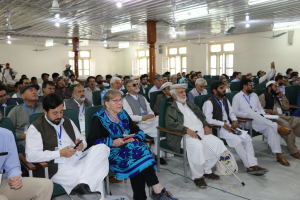
Audience of the 4th International Hindukush Cultural Conference held from Sep 14 to 16, 2022 in Chitral

Dr. Elena Bashir, the president of the 4th International Hindukush Cultural Conference commenting during a session
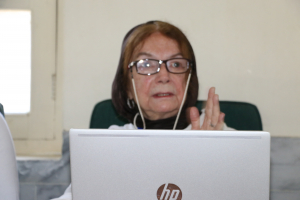
Dr. Elena Bashir, the president of the 4th International Hindukush Cultural Conference delivering the keynote speech
Updates
Pls keep on visiting for more news & updates
Organizers & Supporters
